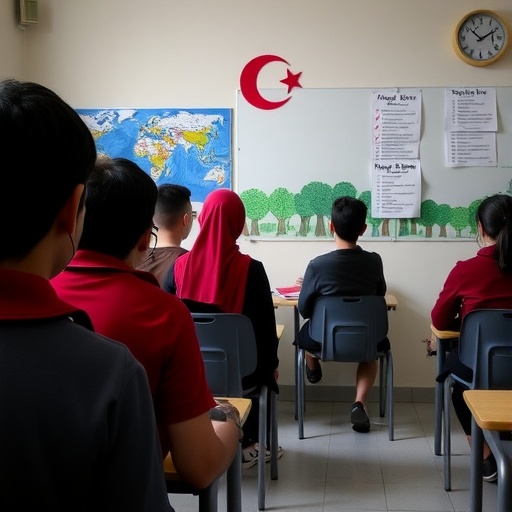In an intricate examination of Turkish secondary schools, a recent study sheds light on the contentious topic of punitive discipline and its impact on students, teachers, and parents alike. The research, undertaken by Selçuk and Özkan, delves deep into the qualitative experiences and perspectives surrounding disciplinary measures in educational institutions. This exploration is particularly crucial as societies worldwide grapple with the ramifications of punitive discipline in shaping young minds.
Turkey, like many nations, has employed a variety of disciplinary tactics within its schools. Punitive measures, which include forms of punishment aimed at correcting or controlling student behavior, have long been a staple of educational practice. However, the efficacy and psychological effects of these tactics are coming under scrutiny. By adopting a qualitative approach, the study seeks to uncover the lived experiences and viewpoints of those directly affected by these measures: the students, teachers, and parents.
From the perspective of students, the research reveals an array of emotional responses to punitive discipline. Many express feelings of anxiety and fear in anticipation of punishment, while others speak to a sense of disempowerment. Such feelings may not only hinder academic performance but can also contribute to broader mental health challenges. The study establishes a clear connection between punitive discipline and student well-being, suggesting that these practices may have far-reaching implications beyond the classroom.
Teachers, as the frontline implementers of discipline, provide a unique viewpoint. The findings illustrate a divide among educators; some view punitive measures as necessary for maintaining order and discipline, while others argue that such tactics are counterproductive. Those who advocate for non-punitive approaches highlight the importance of nurturing a supportive learning environment where students can thrive without the looming threat of punitive repercussions. This dichotomy among educators is integral to understanding the broader implications of discipline in education.
Further complicating the issue is the perspective of parents, who often have their own set of concerns regarding discipline in schools. Many parents support traditional punitive measures, believing that they instill respect and promote accountability in students. However, interviews conducted within the study reveal that a segment of parents is increasingly aware of the negative psychological impact that punitive discipline can have. These parents advocate for alternative strategies, seeking a balance between maintaining discipline and fostering emotional well-being in their children. This evolving view among parents underscores a cultural shift that aligns with global trends advocating for more compassionate educational practices.
The authors emphasize that the structure of the educational system itself plays a pivotal role in shaping disciplinary approaches. An examination of institutional policies reveals that punitive measures are often enshrined in school rules and regulations, making them difficult to challenge. This rigidity can stifle progressive educational reform, leaving many educators and parents torn between their desires for change and the constraints of existing policies. There is a clear need for systemic change that allows for flexibility and innovation in how discipline is approached.
Additionally, the study highlights the role of societal norms and values in influencing perceptions of discipline. Traditional views often uphold strict disciplinary practices as a means of fostering respect and order. Yet, as societies evolve, there is a growing recognition of the need for empathy and understanding in educational settings. This shift in values calls for a reexamination of long-held beliefs about discipline, pushing for more restorative practices that aim to repair harm and build relationships rather than merely punish.
Another significant finding in the study relates to the long-term effects of punitive discipline on youth. The research indicates that exposure to harsh disciplinary measures can lead to negative coping strategies in adolescents, potentially resulting in issues such as aggression, withdrawal, or an increased likelihood of engaging in risky behaviors. Understanding these long-term consequences is critical for educators and policymakers, as it underscores the necessity of fostering a supportive and nurturing environment that prioritizes mental health.
As the study concludes, it becomes evident that the conversation surrounding discipline in Turkish secondary schools cannot be overlooked. The call for a shift towards non-punitive, supportive measures is gaining traction, advocating for an educational system that prioritizes the psychological well-being of students. It is essential for educators, parents, and policymakers to engage in ongoing dialogue about discipline, recognizing the need for change and the importance of adapting practices to better serve the needs of today’s youth.
In this context, the implications of the research extend beyond Turkey, resonating with global educational trends that prioritize mental health and holistic student development. The growing awareness of the adverse effects of punitive discipline is transforming classrooms around the world, as educators seek innovative and compassionate methods to address behavioral issues. As such, this study serves as a vital contribution to the discourse on educational practices, challenging entrenched views and encouraging a rethinking of how discipline can be integrated into a comprehensive approach to education that supports rather than hinders.
In summary, the investigation into punitive discipline within Turkish secondary schools unveiled a complex landscape of perspectives and experiences. The findings advocate for a paradigm shift away from punitive measures, urging education stakeholders to consider the mental health implications of their approaches. As the understanding of student, teacher, and parent perspectives evolves, there lies a significant opportunity to reshape educational discipline in a manner that aligns with contemporary values of empathy, respect, and support.
Subject of Research: Punitive Discipline in Turkish Secondary Schools
Article Title: Punitive Discipline in Turkish Secondary Schools: A Qualitative Exploration of Students’, Teachers’, and Parents’ Perspectives.
Article References: Selçuk, O., Özkan, Y. Punitive Discipline in Turkish Secondary Schools: A Qualitative Exploration of Students’, Teachers’, and Parents’ Perspectives. School Mental Health (2025). https://doi.org/10.1007/s12310-025-09784-9
Image Credits: AI Generated
DOI: 10.1007/s12310-025-09784-9
Keywords: Punitive Discipline, Turkish Secondary Schools, Student Perspectives, Teacher Perspectives, Parent Perspectives, Mental Health in Education.




